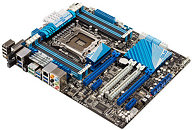Monday, July 29th 2013

ASUS Intros Ivy Bridge-E BIOS Updates for X79 Motherboards
ASUS began rolling out BIOS updates to its socket LGA2011 motherboards based on the X79 Express chipset, which lets them support Intel's upcoming Core "Ivy Bridge-E" processors, namely the Core i7-4960X Extreme Edition, the Core i7-4930K, and the Core i7-4820K. The company's flagship LGA2011 motherboard, the ROG Rampage IV Extreme, gets support for these chips through BIOS version 4206. ROG Rampage IV Formula gets it through BIOS version 4004. The micro-ATX ROG Rampage IV Gene gets it through BIOS version 4206. Elsewhere in ASUS' LGA2011 lineup, the TUF Sabertooth X79 gets it with BIOS version 4104. The mainline P9X79 series gets it with BIOS version 4104. These updates are now available on ASUS support website.

17 Comments on ASUS Intros Ivy Bridge-E BIOS Updates for X79 Motherboards
Wouldn't it have been easier to just talk about changes to the bios and then drop a table with the boards and the required bios version to support the new cpus?
For mine: www.asus.com/Motherboards/P9X79_DELUXE/#support_CPU
It seems a bit redundant to upgrade from x79 based sb-e to ivy-e. Do x79 still not miss out on certain functionality? In other words you have a slightly 'crippled' upgrade path?
I mean and now how much cost their upgrade for next 2-3 years on IB-E on 6 cores 150-200e
Only DDR4 will bring something new. Without that they can stay how they want on that.
That is best possible decision first because motherboard is stable as rock, second CPU is 6 core and monster.
PCIe 2.0 and lack of official support for PCIe 3.0 spoil enjoyment but people with cross over that for selling 3930k and buying 4930K on same motherboard.
But who knew in October/November 2011 how that is best possible option on long term and only 200e more than top IB, SB, and now Haswell platform. Now it's late.
Someone who have money to change every year he don't need to think on that.
Instead, I find it to be better.
A: Get more cores, since I (along with several others,) have a 3820.
B: Be able to run faster memory.
C: To consume less power while performing the same or better.
I think that most complaints about X79 are absurd because most of the functionality is in the CPU and any person who really knows that they're doing wouldn't use the PCH to drive that many drives to begin with. If I really needed 6 ports running that fast, I wouldn't be using the PCH in the first place. Also the only drives that really benefit from SATA 6Gb/s are SSDs. So I find it unrealistic that anyone really needs that many ports and if they do they shouldn't be using the PCH and they clearly have the money for a RAID card if they have 6x SSDs to use. The PCH is not the end, it is the beginning. It's not designed to offer everything and anything. It's there to get you started and satisfy most user's needs.
I know that if I were to buy any more drives and ran RAID-5 larger than 4 disks, I wouldn't use the PCH.
Edit: Also, adding more to the PCH would increase the amount of heat it releases under load. I'm sure Intel doesn't want to have to actively cool the PCH.
www.techpowerup.com/forums/showthread.php?p=2982262#post2982262
Thanks!
Apparently Lenovo's older LGA2011 workstation motherboards won't be compatible, not sure if they are refusing to release a new BIOS for those or there is a hardware incompatibility.